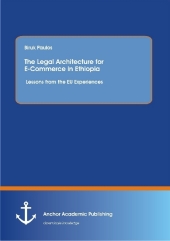 Neuerscheinungen 2015Stand: 2020-02-01 |
Schnellsuche
ISBN/Stichwort/Autor
|
Herderstraße 10
10625 Berlin
Tel.: 030 315 714 16
Fax 030 315 714 14
info@buchspektrum.de |

Biruk Paulos
The Legal Architecture for E-Commerce in Ethiopia: Lessons from the EU Experiences
1. Aufl. 2015. 80 p. 220 mm
Verlag/Jahr: ANCHOR ACADEMIC PUBLISHING 2015
ISBN: 3-9548944-6-7 (3954894467)
Neue ISBN: 978-3-9548944-6-8 (9783954894468)
Preis und Lieferzeit: Bitte klicken
The technological developments in the area of cyberspace have transformed e-commerce in many nations and their internet economies in the past few decades. The advances in these technologies coupled with the mushrooming of Cyberspace frauds by internet hackers and crackers have ensued in a very complicated problem for both developed and developing nations. The internet economy, being a recent development in many countries of the world, has not yet grown to its fullest measure. However, multiplicities of threats including the infringement of cyber security policies, cyber crimes, and other online business frauds have come to be the chief hitches that impede the development of e-commerce in general and the internet economy in particular. Cross-Border E-commerce underlies the increasing trends of internet economies in different countries including both the developed and developing countries. The boosting of these internet economies through cross-border e-commerce have attracted the attentions of many improper online embezzlers who always strive to industrialize the underground internet economies gained through online business frauds, cyber crimes and so many other improper online business transactions. Lots of efforts have been exerted by many countries, the major ones being the US and the UK, to halt the threats of business frauds in e-commerce and cyberspace insecurity which would otherwise jeopardize both small scale and large scale online businesses in these countries. Besides, many intergovernmental organizations including the United Nations (UN), the European Union (EU), the African Union (AU), the Organization of American States(OAS), Organization for Economic Cooperation and Development(OECD) and United Nations Commission for Trade And Development(UNCTAD) and United Nations Economic Commission for Africa(UNECA), just to name few, have began the work of comprehensively studying the threats targeted at the development of e-commerce and related cybercrimes. In fact, the US and the EU have been praised to have done a pioneering work of regulating the legal atmosphere of cross-border e-commerce to make an effective cross-border e-commerce possible.
Cross-border e-commerce has been a very recent and infant development in Ethiopia. Ethiopia does not have an orchestrated system for regulating cross-border e-commerce. This work explores the experiences of the EU and other International Organizations in regulating cross-border e-commerce and recommends Ethiopia to draw workable lessons particularly from the EU experiences to buttress the current efforts to design the legal architecture for an effective cross-border e-commerce in the country.


